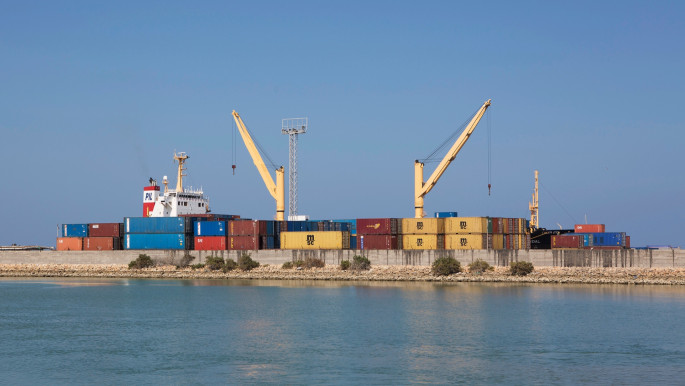What will Biden's presidency mean for the Horn of Africa?
Nonetheless, President Joe Biden may have no choice but to make difficult decisions in this volatile region against the backdrop of Ethiopia's civil war, the Nile Dam dispute, as well as Sudan's fragile political transition.
To understand how Biden might approach the Horn of Africa, it is important to take a look at the Trump administration's policies in this region.
With a strategy of "minimal engagement", the Trump administration believed that the US's trade and investment would counter the influence of other powers, chiefly China, in this part of the African continent.
Yet throughout the past four years, there has been a steady decline of US clout in the Horn of Africa despite Washington remaining an influential actor in East Africa, as underscored by Sudan's decision in October 2020 to (nominally) normalise relations with Israel.
Like other parts of the world, the Horn of Africa is an area where the Trump administration's incoherence and lack of strategic thinking led to openings for other powers such as Gulf Cooperation Council (GCC) states, Turkey, China, and Russia to gain greater footholds.
 |
Like other parts of the world, the Horn of Africa is an area where the Trump administration's incoherence and lack of strategic thinking led to openings for other powers |  |
Biden will begin his presidency with a robust background in foreign affairs as the former Vice President (VP) and chairman of the Senate Committee on Foreign Relations. In his campaign documents and speeches, he outlined a foreign policy strategy broadly based on reasserting America's global leadership.
This strategy's pillars are multilateralism, commitment to democracy and democratic values, climate diplomacy, and confronting Russia and China. But what will this mean for the Biden administration's policies vis-à-vis the Horn of Africa?
 |
|
| Read more: The geopolitical shadow of Ethiopia's Tigray conflict |
As a candidate, Biden did not specifically address this region and the challenges which it represents to Washington. Nonetheless, there is reason to expect some degree of continuity from Trump to Biden in the Horn of Africa, at least in some areas.
As Biden has spoken favourably about the use of targeted force in counterterrorism operations abroad, the controversial drone strike campaign against Al-Shabaab militants in Somalia, which occurred under President Barack Obama and continued under Trump, will most likely continue unabated.
Ultimately, despite having strong relations with Ethiopia as well as a military presence in Somalia and Djibouti, the US has for years lacked a clear strategy for the Horn of Africa. It remains to be seen if Biden will pursue one. If the 46th American president attempts to formalise a more coherent foreign policy in the region, he will have to contend with the reality of regional actors perceiving Washington as a power in decline.
Regardless of whether or not Biden devises a well thought out approach to the Horn of Africa, this region's dossiers will inevitably capture his administration's attention. Given Biden's prioritisation of multilateralism, it is a safe bet that he will seek to address issues in the Horn of Africa through regional organisations including the United Nations, African Union, Intergovernmental Authority on Development (IGAD), and the GCC, among others.
 |
Given Biden's prioritisation of multilateralism, it is a safe bet that he will seek to address issues in the Horn of Africa through regional organisations |  |
The first and most pressing issue is going to be Ethiopia. What began as a military showdown between the central government and the Tigray People's Liberation Front (TPLF) has rapidly escalated into a regional conflict touching three countries.
With the Ethiopian army carrying out military operations in the northern region of Tigray, the TPLF and Eritrean forces have reportedly engaged in combat, while at least 20,000 refugees have already fled to Sudan. The current situation is untenable and is a symptom of a deeper crisis threatening Ethiopia's territorial integrity.
 |
|
| Read more: A gateway to Africa: Russia's new naval base in Sudan |
Washington is the only actor capable of bringing the parties to the table and preventing this dramatic crisis from tearing Ethiopia apart. Another issue that will rank high on the agenda is the Nile Dam dispute with Egypt. Here again tension is critically high, with Addis Ababa ready to start filling the dam basin without an agreement on water distribution with Cairo. Egypt, in turn, has threatened to use force to destroy the dam, a scenario that Trump had astonishingly justified in a phone call on 24 October 2020 with the Sudanese prime minister.
But while the Trump administration was seemingly supportive of Egypt's demands, a Biden presidency, which should be more concerned about human rights violations, might be less accommodating of Cairo's position while taking a more balanced position over the dispute.
If met with substantial diplomatic pressure, this new posture could facilitate an agreement between Addis Ababa and Cairo. It will be crucial for the Biden administration to seize this window of opportunity before Egypt acts unilaterally.
 |
The actions of the Biden administration are difficult to foresee and will generally depend on the global strategy which it adopts to engage and/or confront China |  |
Besides immediate emergencies, the main underlying issue that the Horn of Africa has in store for Washington is China. The Horn of Africa is one of the regions experiencing the deepest penetration of China in terms of trade and investment, as well as a military presence since the construction in 2017 of its first military base abroad in Djibouti. In broad geostrategic terms, the region is crucial because of its position along the strait of Bab El-Mandab and the Red Sea, where 10 per cent of international trade and a large portion of the world oil pass every year.
The actions of the Biden administration in this domain are difficult to foresee and will generally depend on the global strategy which it adopts to engage and/or confront China. However, the lack of a strategy for the Horn of Africa and the pivot to tackling China on trade matters and in the Asia-Pacific makes any confrontation on geopolitical and geoeconomic grounds in the Horn of Africa quite unlikely.
 |
|
| Read more: Troubled waters: Ports and power in the Horn of Africa |
With Biden seeking to counter Russia more aggressively, there could be implications for the Horn of Africa's geopolitical order. While the Kremlin pursues an "engaged opportunist" approach to the region, in which the Russian leadership seeks to land more arms contracts and secure a greater role as a "vital investor" in defence industries, all while turning to its "strategic use of debt forgiveness", Biden will have to contend with the realities of Russian efforts to play "spoiler" to Washington's agenda in East Africa.
The Horn of Africa will present the Biden administration with immediate and long-term challenges. Immediate crises in Ethiopia will demand particular attention and strong US commitment to their resolution. These issues will clash with the priority given to the pandemic and its economic fallout but will require attention, nonetheless.
While the approach that Biden adopts for dealing with these issues is not clear yet, the emphasis that Trump's successor puts on multilateralism indicates that he might address these crises in coordination with the African Union and IGAD, hence fostering the endogenous regional order.
But besides emergencies, Africa does not seem to rank high on Biden's agenda, meaning that the narrowing focus of previous administrations to economic relations and counterterrorism is likely to stay. In sum, whether there will be a coherent strategy or not, the Horn of Africa will remain a matter of concern for Washington in the post-Trump era.
Giorgio Cafiero is the CEO of Gulf State Analytics, a Washington, DC-based geopolitical risk consultancy.
Follow him on Twitter: @GiorgioCafiero
Corrado Cok is an intern at Gulf State Analytics. He previously worked in Djibouti, where he researched the Red Sea's geopolitics and Arabian-East African relations.



